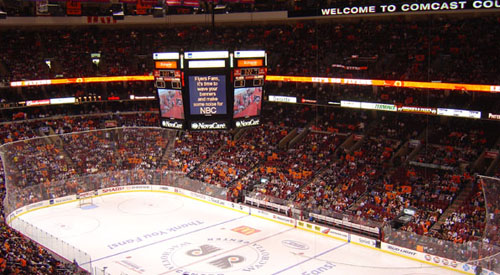
Recession means lockout for an unprepared NHL
With an inevitable recession looming and just about everybody becoming more cautious of spending money, the National Hockey League is entering their third post-lockout year in a row with an increased salary cap.
In the NHL’s first season under the new collective bargaining agreement, the cap was set at $39 million with a minimum set at $21.5 million. Entering this season both have increased substantially to the point where the minimum this year is more than the original ceiling. This year’s cap is set at just over $56.5 million while the floor is just over $40 million. The entire league pays over $1.6 billion in salaries alone, not including bonuses.
With the average ticket price right now sitting around $49, some teams are finding it hard to fill their seats, which is quite visible on some nationally televised games.
In some sections in New Jersey, Columbus and Atlanta, among many others, it looks more like my brother’s midget practice as opposed to the premier level of hockey. Despite the beautiful arrangements of empty seats seen at some games, the NHL is claiming that the average attendance is just over 17,000 per game. The team with the lowest average attendance is the New York Islanders with just over 14,500 fans.
[php snippet=1]
The empty seats have prompted teams’ respective marketing committees to address the situations and find ways of attracting fans even with the dismal economy. So far giveaways such as food stamps have been handed out along with all-you-can-eat sections and eat for free nights in certain arenas.
The St. Louis Blues just launched the biggest giveaway campaign. It’s called “Fan Bailout Plan” and entails three separate ways to save. They are dropping 500 lower bowl tickets every game to only $25 and 500 upper bowl tickets to just $11.20. The biggest part of the FBP is called, “Fannie & Freddie Mortgage Saturdays”. The Blues plan to select one ticket stub for every remaining Saturday home game and the Blues organization will pay that person’s mortgage or rent for the next four months with a maximum of $4,000 per winner.
A touchy subject with Americans? Sure, but at least the Blues are trying to help their fans. Other teams like the Toronto Maple Leafs continue to jack their prices up on tickets (their average is $76.15) without giving back at all. There isn’t one ticket promotion on their website, just plugs for their season ticket plans and VIP suites.
Regardless of what kind of promotion is next in the life and time of the NHL, it isn’t going to make a difference. Next year the NHL’s ticket prices will be even higher. Attendance will be down, the salary cap will rise and the league will be one step closer to yet another lockout.
But can we really sit here and rip on the NHL and its teams for making ridiculous profit and sending their ticket prices through the roof? After all, ticket prices are based primarily on supply and demand, which is why the top five teams with the most expensive tickets are Canadian. If the fans continue to not show up, whether their reasons be to take that $50 and buy their family groceries, put gas in the vehicle or simply spend it on something else, the NHL will eventually have to take notice to what their reality is.
The lack of attendance in NHL arenas coinciding with the high ticket prices and the steady increase of salaries could be leading the NHL down the recession road, right behind the rest of North America, but in hockey terms, it’s just called another lockout.
[php snippet=1]

